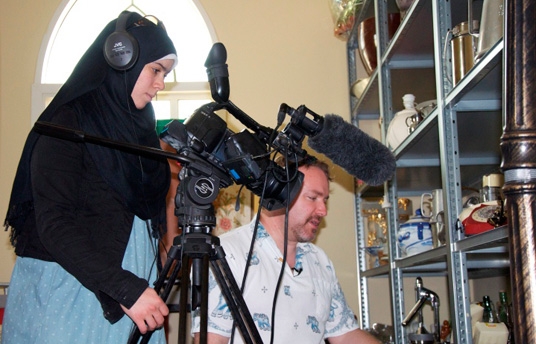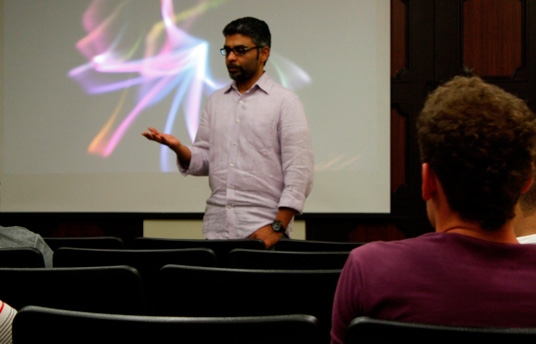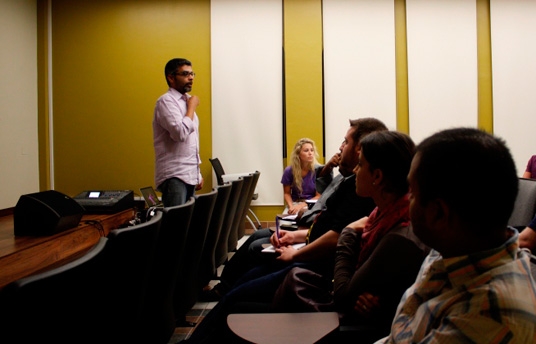DIY Documentary Part 2 - Pre-production
Aug 29, 2011

Written by Jad Salfiti, Video Journalist, New Media
Now that you’ve completed the development stage, you can proceed to the pre-production stage. You are preparing to make a film! But you have to do your homework, and you have to be prepared long before any cameras start to roll.
Pre-production involves thoroughly thinking through everything you’ll need to do, and to plan, from start to finish, to make your film.

Yasir in a pre-production lecture at DFI.
The prep work in filmmaking almost always takes much longer than the filming itself. It’s a mistake to rush into shooting without thinking everything through.
In pre-production, every step of actually creating the film is carefully designed and planned. There are many ways to approach this, but you can break down pre-production into both technical and content planning.
Yasir tells us about documentaries as films based on a larger truth, with real people and real stories
ياسر يخبرنا أن الأفلام الوثائقية قصص حقيقية تستند على حقائق كبرى، أبطالها أشخاص حقيقيون
On the content side, you need to locate all your sources of film and photographs – any images you can find to tell your story. How will you get them? Who are your voices? How do you know for sure they will let you tell their story?
The process starts with research. Research, research a bit more, and then, yes, conduct further research. Only once you have researched every possible avenue and potential direction, can you start taking practical steps. Visit locations. Talk to sources.
Read up on your story. The research process is going to take you down many different paths. Meet with people who know the story. Maybe you’ll decide to interview them later on.
Once you’ve done your research, you need to define what you are trying to accomplish. Put your plans on paper. When you are ready for this stage, consider creating the following documents:
SCRIPT OUTLINE
A script outline will help develop the potential elements in your story. The more developed your story concept is before you start filming, the better off you will be. Even if this is just notes on one scene after the next, the process of outlining your story will help you identify things you need, and might not have thought of otherwise. It will also help you plan your shoot, and think through the elements you have to film.
In this video we learn about effort and resistance as the backbone behind any good story.
يخبرنا هذا الفيديو عن عوامل الجذب والطرد التي تقوم عليها كل القصص الجيدة.
PRODUCTION SCHEDULE
A production schedule will help you further develop the plan you’ve laid out in your outline. Are there key events you need to shoot that might only happen once? Get these dates down on paper. What about people? Who do you want to interview and when are they available? Talk to people, plan visits to your locations, and make a schedule of the events, and appointments, that need to be filmed to tell your story.

Students in Documentary Workshop.
Once a script outline and shooting schedule have been completed, move on to the technical side of filmmaking. What equipment and facilities do you need to adequately shoot your documentary? Again, get your thoughts on paper and plan ahead.
BUDGET
Filming is expensive, so you have to think of everything. Where do you need to go? What will you need to do? Who will you need to help you and what will they charge? What camera will you use? Will you film yourself, or will you need a crew? Making a budget will help you keep costs under control. It will also help you in planning and scheduling your film.
EQUIPMENT LIST
Write down everything you think you will need. Lights? Light stands? Cameras? Microphones? What type and how many? Your equipment list and your budget will likely grow together.
The better you plan, the better off you will be. And make a back-up plan too!